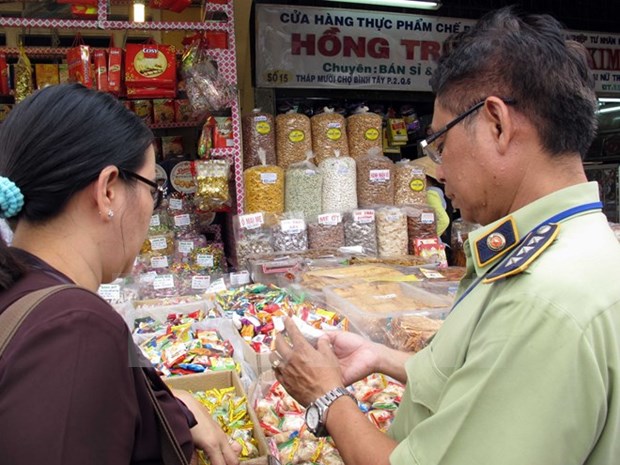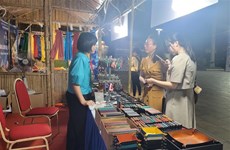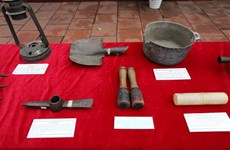Hanoi, Bac Giang work together for safe food
Hanoi and Bac Giang northern province have agreed a cooperation programme to develop safe agricultural product consumption from 2016-2020.
 Authorities inspect food safety in Hanoi. (Source: VNA)
Authorities inspect food safety in Hanoi. (Source: VNA)Hanoi (VNA) – Hanoi and Bac Giang northern province have agreed a cooperation programme to develop safe agricultural product consumption from 2016-2020.
At the seminar held in Hanoi on April 19, Tran Thi Phuong Lan, Deputy Director of Hanoi Department of Trade and Industry said it was an annual joint programme with three main contents: Bac Giang will set up an association from safe agro-product growing to consumption, select key agro-products that were produced in accordance with the biological safety process, and stabilise the supply to the capital city.
Hanoi will organise events to introduce the city’s commodities at Bac Giang market.
For this year’s plan, Hanoi Department of Trade and Industry will hold two events for Luc Ngan litchis sales in the city (in mid June) and in Bac Giang Province (in November).
Deputy Chairman of Hanoi People’s Committee, Nguyen Doan Toan said the city will create favourable condition for lorries weighing under 5 tonnes to carry Bac Giang agricultural products to the city.
City authorities will support Bac Giang Province’s enterprises in expanding consumption market including at whole-sale markets, supermarkets and processing companies, he said.
Duong Van Thai, Deputy Chairman of Bac Giang People’s Committee said the programme would help Hanoians purchase safe agricultural products and help farmers.
Bac Giang authorities determined creating safe products started from safe seed production and safe breeding.
Besides establishing safe product trade names, Bac Giang enterprises will use brand- name stamps to attest to the origin of products.
Toan said proving safe origins would ensure sustainable agricultural development with quality products.
According to the Hanoi Plant Protection Department, safe vegetable distribution in the city are through six forms: agricultural enterprises contracts with supermarkets (accounting for 1.5 percent of total safe vegetable output), retail agencies (1.5 percent), restaurants or collective kitchens (1.8 percent).
The other forms include whole-sale traders (12.6 percent), farmers themselves carrying vegetable to sell at residential quarter’s market (26.8 percent) or at whole-sale markets (55.8 percent).
The department has granted certification on safe vegetable production to 5,100ha in the city.
Nguyen Duy Hung, the department director said safe vegetables without brand-name stamps were sold at residential areas and whole-sale markets.-VNA













